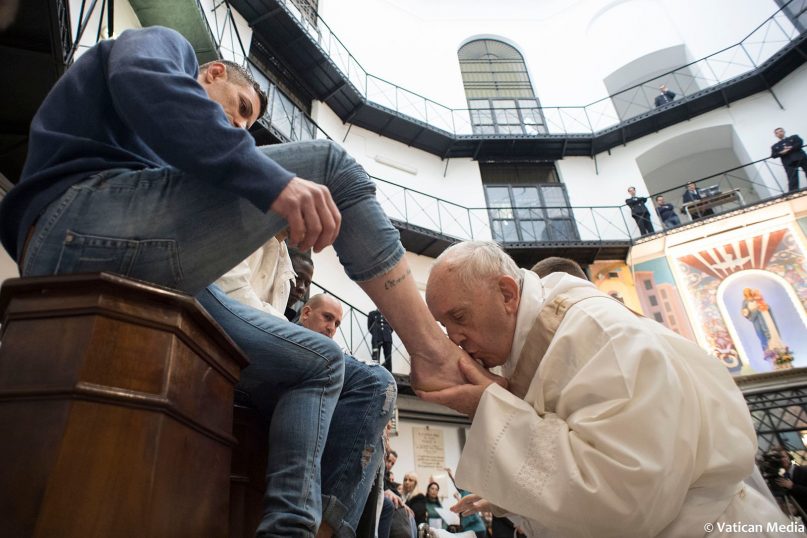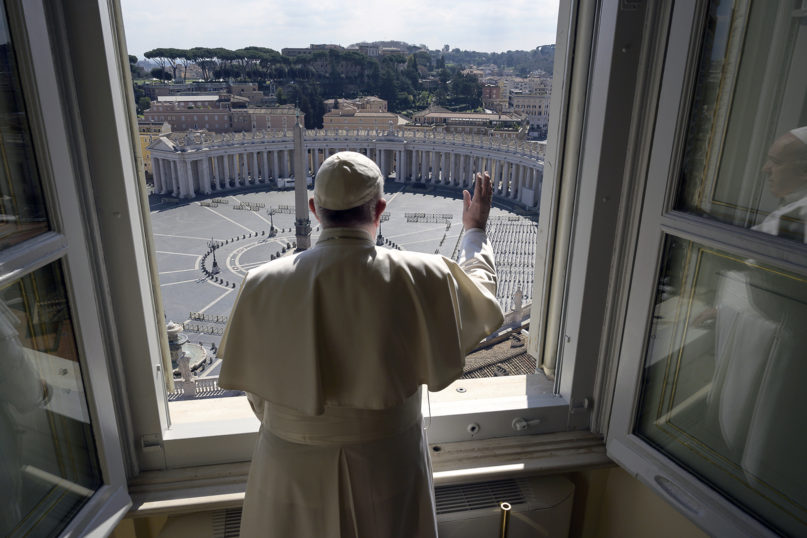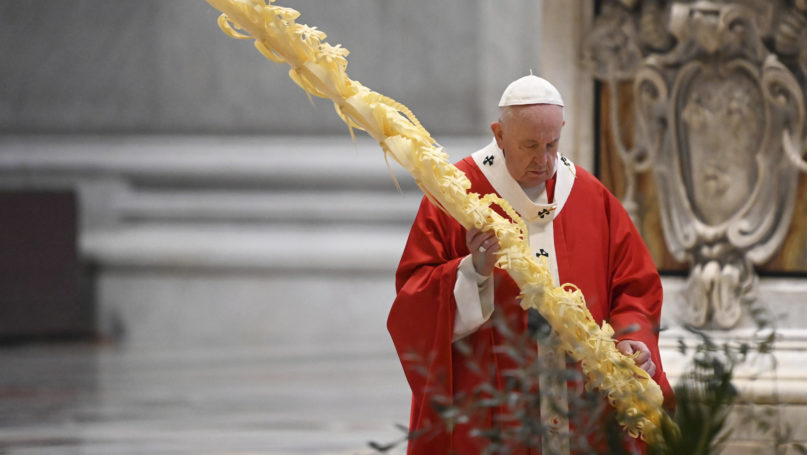(RNS) — This isn’t the first plague the Roman Catholic Church has experienced. Nor is it the first time that Easter has taken on a sober tone for the faithful. But while most Catholics understand that we’ll have to stream our Easter celebrations this year, this Sunday’s stripped-down worship will be a shadowy imitation of not only what we are used to offering, but of what the Catholic faith is all about.
Holy Week begins the Easter Triduum: when we commemorate the passion, death and resurrection of Jesus Christ. The liturgical rites for these days employ the fullness of the human senses in the worship of God. Feet are washed. The sweet smoke of incense fills the church. The Blessed Sacrament, the consecrated host, is brought out of the tabernacle for all to adore.
As the week goes on, the cross is unveiled, then adored by the faithful and the Paschal candle is blessed, marked with the wounds of Christ, its light shared by all the faithful. Water and oils are consecrated to God, and then used to initiate new Catholics into the sacramental life. We eat and drink the body and blood of Jesus Christ in the Eucharist, enjoying anew the wedding feast of the Lamb once slain.
Worship in Catholicism, along with Orthodoxy, is fundamentally embodied. Catholics encounter Jesus Christ by means of holy desire. Such spiritual desire, in fact, has been a replacement for the reception of the sacraments in the history of Catholicism. If someone preparing for initiation into the church died, perhaps suffering martyrdom, this was known as a baptism of desire.

Pope Francis washes the feet of inmates during his visit to the Regina Coeli detention center in Rome on March 29, 2018, where he celebrated the “Missa in Coena Domini.” (Vatican Media via AP)
RELATED: Click here for complete coverage of COVID-19 on RNS
Instead of Easter Communions, most of the faithful will instead say a prayer facilitating spiritual communion on Easter morning that specifically invokes this desire:
My Jesus,
I believe that You are present in the Most Holy Sacrament,
I love You above all things,
and I desire to receive You into my soul.
Since I cannot at this moment receive You sacramentally,
come at least spiritually into my heart.
I embrace You as if You were already there
and unite myself wholly to You.
Never permit me to be separated from You.
But digital desire is not the coin of the Catholic realm. Our worship begins when we enter a church building, our gaze invited upward to perceive the dance of the angels and saints on the ceiling above. We smell the residual sweetness of years of incense being offered up for the glory of God. We eat and drink the body and blood of Jesus Christ in the Eucharist, gladdening our hearts through this act of Communion. We do all of this in the presence of an assembly of saints and sinners alike, the faithful remnant called together by Christ.
Now, our theological inquiry has informed us that such sacramental presence exceeds the bounds of the created order. We don’t reduce God to church buildings and incense. We don’t believe that God is otherwise absent from the created order, accessible only in these spaces. Lest worship becomes about our control, our power, summoning the infinite God to enact our will. Sacraments aren’t magic.
Still, the God who emptied himself in the Incarnation, who fed thousands on a hillside with bread from heaven, who suffered and died in the flesh as an act of love, who rose from the dead his body still bearing the marks of the wounds of love, has become accessible to the human family through matter. In Catholicism, matter matters. And when we don’t have this matter, it really matters.

Pope Francis delivers his blessing over an empty St. Peter’s Square from inside the Apostolic library at the Vatican on March 15, 2020. (Vatican News via AP)
This absence hurts. Of course, I’ll tune in on Holy Thursday, Good Friday, Holy Saturday and Easter Sunday. I’ll sing along to the music. I’ll adopt various liturgical and devotional practices in the home during these days. My family will use our body in worship, singing divine praises for at least the neighbors to hear.
And yet, not being there, with those chubby angels and glorified saints, with the stained glassed windows that allow for the play of light and darkness, with the smell of incense wafting to the rafters, with the voice of my neighbor singing (perhaps out of tune) to “Jesus Christ Is Risen Today” — it matters.
And so, we the faithful will engage in spiritual communion this year. We’ll worship in our homes, using our bodies. We may wash the feet of our families.
At the same time, we’ll long for the day when once more we hear the resounding notes of that organ, wonder at the refraction of light as incense rises to the heavens, watch as our neighbor awkwardly removes her shoes during the footwashing, and as all the hoi polloi adore the wood of the cross.
In Catholicism, matter matters.
Digital communion, this year, is a kind of spiritual aperitif. It’s OK to long, when it’s all over, for the feast itself.
(Timothy P. O’Malley is director of education in the McGrath Institute for Church Life and a professor in the department of theology at the University of Notre Dame. The views expressed in this commentary do not necessarily reflect those of Religion News Service.)





